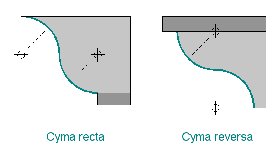
People keep asking me about my current obsession.
The Line of Beauty is a book by Alan Hollinghurst about being gay in London 1984-87. It won the Booker prize and has recently been turned into a three-part series by the BBC.
In the book the Line of Beauty is an "ogee," described by Hogarth as a kind of curve that curves both ways. This elevated description is apt because the main protagonist of the novel, Nick Guest, is a kind of "aesthete" kept on hand as an amusement (in various ways) by various members of the upper class while he writes a Ph.D. thesis on Henry James.
The Image of an Ogee above is from http://www.sundialsoc.org.uk/glossary/ap07/ogee.htm
But in the book, Nick is also very openly gay, and so the line of beauty is also the line of a guy's ass and a line of cocaine.
In sum the book is a refined novel about homosexuality, cocaine, and asset strippers written with the literary style of Henry James.
There has been a LOT written about this book/TV series in the British Press. I especially liked Andrew Anthony's article in The Observer of Sunday May 21, 2006
IT'S THE homoerotic story of a group of young narcissistic men, the kind you see modelling underpants, lured to the capital by the promise of fame, fortune and the ready supply of anonymous sex. At first they appear charming and talented but with success they become arrogant and full of hubris and it all ends in tearful disillusionment and bitter recrimination. But that's enough about the Arsenal football team for the moment, let's now turn to The Line of Beauty
Alan Hollinghurst's Booker Prize-winning novel was an exceptional work for an impressive number of reasons. It created vivid, memorable characters living in a world - the exclusive environs of west London - that was exquisitely realised. It depicted gay sex in the sort of vital, authentic and yet integral fashion that is all too rare, for any form of sex, in contemporary fiction. It also rescued the 1980s from worn-out clichés and heavy-handed satire to show a period of liberating optimism as well as heartless affluence. Added to which it was very funny. And almost hidden beneath the glittering surface of the narrative, like a shipwreck only partially revealed by the ebb and flow of a great tide, was a doomed love story of haunting power.
No comments:
Post a Comment